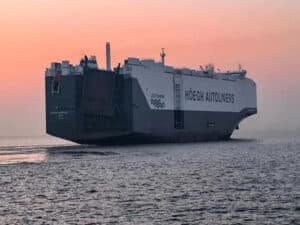
Why Euronav is skeptical on scrubbers
Written by Nick Blenkey
Euronav CEO Paddy Rodgers
OCTOBER 30, 2018 – “The direction of travel for the large tanker market has changed from going sideways to up,” said Euronav CEO Paddy Rodgers, as the Antwerp, Belgium, headquartered tanker giant today reported results for the third quarter of 2018 that included a $58.7 million loss.
“Demand for and supply of crude has continued to improve as OPEC production has increased and the dislocation from Iranian sanctions has boosted and will continue to boost commercial tanker operators,” said Rodgers, who says that the company’s merger with Gener8 merger has positioned it “with one of the most modern, efficient large tanker fleets accompanied by the strongest balance sheet,” leaving it “ideally levered to an upgrade on improving tanker cycle fundamentals through 2019 but also further anticipated positive developments from regulatory changes to shipping markets from the application of IMO 2020.”
SKEPTICISM ON SCRUBBERS
It seems that exhaust gas cleaning systems are unlikely to be a part of Euronav’s plans for dealing with IMO 2020.
The company says it has three areas of concern when assessing scrubber installation on its fleet and continues to thoroughly investigate each of them.
1. Upfront capital investment of $5 million per VLCC with very low visibility on returns
Installing scrubbers requires an upfront capital investment today with virtually no visibility of a return on capital. Promoters of scrubbers have used MGO as a proxy for the price of compliant fuel. Some refiners including Sinochem have recently confirmed that they will sell clean compliant fuel at a price likely to be half the difference between dirty HFO and MGO. So the investment case now has half the returns being promoted and it is still 14 months before implementation and nothing suggests this price gap will not further narrow in that time.
2. Risk of pollution from scrubbers and operational concerns
Open-loop scrubbers (OLS) use seawater brought on board to remove sulfur from exhaust gases, but the wastewater produced contains a toxic cocktail of sulfuric acid constituents, polycyclic aromatic hydrocarbons and heavy metals which are pumped into the open ocean, essentially transferring pollution from air to sea.
(a) Pollution risks
- Putting sulfur back into the sea reduces its natural buffering capacity
- Unknown cumulative impact of increasing sulfur content in world’s oceans
- Likely increase in ocean acidity over time
- OLS use increases CO2 emissions, cheaper fuel will incentivize owners to speed up the use of OLS
(b) Operational risks
- Additional capex and opex costs of operation
- Unproven application of this technology in a large volume tanker environment
- Known risk of corrosion
- Attention needed to mitigate safety/operational risks which are still quite uncertain
(c) Lack of scrutiny over technology
- Scrubber waste water disposal never been systematically investigated
- No valid or long term data available
- Cumulative impact on sensitive or congested sea lanes unknown
(d) Future regulatory risks
- Court of public opinion yet to be fully tested on OLS
- Risk of action by Port or Flag states
- Increasing application of rising CSR standards by investors & fuel producers
Promoters of this technology argue that the open oceans dilute waste water, rendering it harmless. But the solution to pollution is not dilution. Like plastic contamination over the years, we don’t know what the cumulative effect of this waste water will be or how it will interact with existing seaborne pollutants, particularly in congested sea-lanes like the English Channel, Malacca Straits or Baltic Sea.
3. Implementation and Enforcement regime
Breaches of current emissions standards are on the rise in their existing environmental control zones (ECA). So far flag states appear ill-equipped to ensure regulatory compliance. Installing a scrubber enables regulatory compliance with the continued use of non-compliant high sulfur fuel. But weak regulatory oversight means non-compliance in the open sea, whether through breakdown or malfeasance, cannot be effectively controlled.
Conclusion
Euronav wholeheartedly embraces the IMO 2020 regulations – we want to adopt the directive properly, universally and without delay. Refiners and oil producers have increasingly made clear that sufficient compliant fuel will be available. Scrubbers are therefore a loop hole which makes enforcement of the sulfur ban extremely complex, difficult to enforce and likely to facilitate non-compliance.
Euronav continues to work closely with suppliers and producers on alternative mechanisms in which to capture volatility in the prices and differentials between HFO and LSFO and retains a very strong balance sheet providing optionality and flexibility to address the challenges of implementing IMO 2020





Leave a Reply
You must be logged in to post a comment.